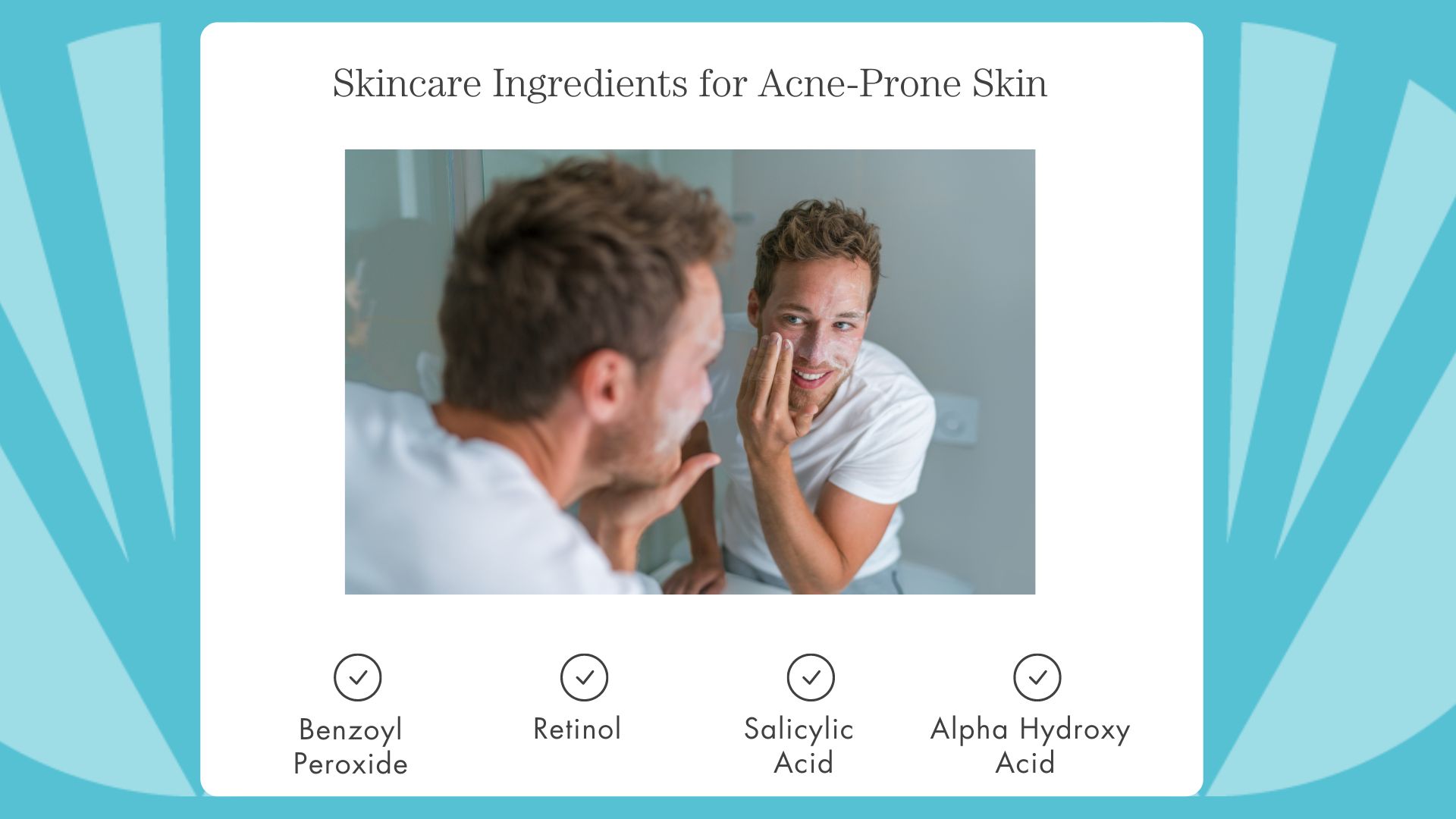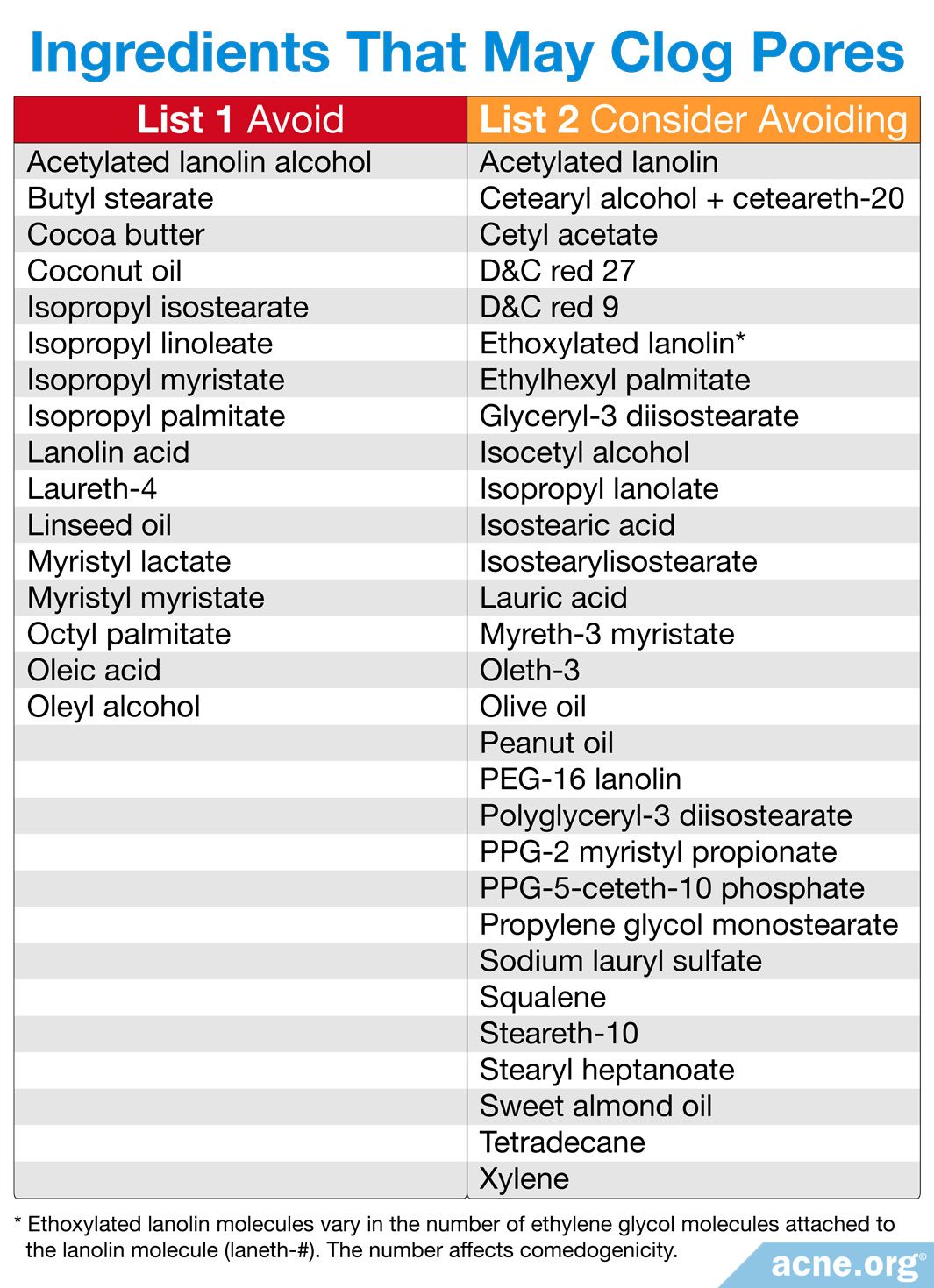Navigating the Skincare Jungle: Identifying the Worst Ingredients for Acne-Prone Skin
Related Articles: Navigating the Skincare Jungle: Identifying the Worst Ingredients for Acne-Prone Skin
Introduction
With great pleasure, we will explore the intriguing topic related to Navigating the Skincare Jungle: Identifying the Worst Ingredients for Acne-Prone Skin. Let’s weave interesting information and offer fresh perspectives to the readers.
Table of Content
Navigating the Skincare Jungle: Identifying the Worst Ingredients for Acne-Prone Skin
![Skin Care Routine For Acne Prone Skin – [An Infographic] – Dermology.us](https://i.pinimg.com/564x/5e/3c/ca/5e3ccaea593e2571e1fed86657e4750f.jpg)
Acne, a prevalent skin condition affecting millions, can be a frustrating and persistent challenge. While various factors contribute to its development, certain ingredients commonly found in skincare products can exacerbate the problem, leading to inflammation, breakouts, and other unwanted skin reactions.
This comprehensive guide delves into the world of skincare ingredients, identifying those that are particularly detrimental for acne-prone skin. Understanding these ingredients empowers individuals to make informed decisions about their skincare routine, ultimately promoting clearer, healthier skin.
Understanding Acne and its Triggers:
Acne arises from a complex interplay of factors, including:
- Excess sebum production: The skin’s natural oil, sebum, can become overproduced, clogging pores and creating a breeding ground for bacteria.
- Inflammation: Inflammation within the hair follicles can cause redness, swelling, and pus formation, leading to visible acne lesions.
- Bacterial overgrowth: The bacterium Propionibacterium acnes (P. acnes) thrives in clogged pores, contributing to acne development.
- Hormonal fluctuations: Hormonal changes, particularly during puberty, menstruation, and pregnancy, can trigger increased sebum production and acne flare-ups.
- Genetics: A predisposition to acne can be inherited, making some individuals more susceptible to the condition.
Worst Ingredients for Acne-Prone Skin:
While a multitude of ingredients exist in skincare products, some stand out as particularly problematic for acne-prone skin. These ingredients can exacerbate inflammation, clog pores, and disrupt the skin’s natural balance, leading to worsened acne symptoms.
1. Comedogenic Oils:
Comedogenic oils are known to clog pores, contributing significantly to acne formation. These oils possess a high comedogenic rating, indicating their likelihood of blocking pores. Common culprits include:
- Coconut oil: Despite its popularity, coconut oil is highly comedogenic, often exacerbating acne.
- Olive oil: Similar to coconut oil, olive oil can clog pores and lead to breakouts.
- Shea butter: While shea butter offers moisturizing benefits, its comedogenic nature makes it unsuitable for acne-prone skin.
- Cocoa butter: A popular ingredient in many skincare products, cocoa butter can also contribute to clogged pores and worsen acne.
2. Mineral Oil:
Mineral oil, a petroleum-based product, is often used as a moisturizer in skincare. While it can provide temporary hydration, its occlusive nature can trap sebum and dead skin cells, leading to clogged pores and acne.
3. Lanolin:
Lanolin, a waxy substance derived from sheep’s wool, is commonly used as a moisturizer and emollient. However, its thick texture can clog pores, making it unsuitable for acne-prone skin.
4. Alcohol (SD Alcohol 40-B, Alcohol Denat):
While alcohol can initially provide a drying sensation, its dehydrating effects can actually trigger the skin to produce more oil, ultimately contributing to acne. Additionally, alcohol can irritate sensitive skin, worsening inflammation and redness.
5. Fragrance (Parfum):
Fragrances, often added to skincare products to enhance their scent, can be a significant irritant for acne-prone skin. They can trigger allergic reactions, inflammation, and breakouts.
6. Essential Oils:
Essential oils, despite their popularity, can be highly irritating and comedogenic for acne-prone skin. Their potent nature can trigger inflammation, clog pores, and exacerbate acne symptoms.
7. Silicones:
Silicones, often found in primers and foundations, can create a barrier on the skin, preventing it from breathing and potentially clogging pores.
8. Sodium Lauryl Sulfate (SLS) and Sodium Laureth Sulfate (SLES):
These common surfactants, found in many cleansing products, can strip the skin of its natural oils, leading to dryness and irritation. This can trigger the skin to overcompensate by producing more oil, contributing to acne.
9. Parabens:
Parabens, used as preservatives in skincare products, can irritate sensitive skin and contribute to breakouts.
10. Synthetic Dyes:
Synthetic dyes, often used to color skincare products, can be harsh on the skin and contribute to irritation and breakouts.
Beyond Ingredients: Understanding the Importance of Product Formulation:
While individual ingredients play a crucial role in acne development, the overall formulation of skincare products is equally important. Products containing a high concentration of comedogenic ingredients, even if they are individually considered safe, can still trigger breakouts.
Tips for Acne-Prone Skin:
- Choose Non-Comedogenic Products: Opt for products labeled as non-comedogenic, indicating they are less likely to clog pores.
- Read Labels Carefully: Scrutinize product labels, paying close attention to ingredients. Avoid products containing the ingredients mentioned above.
- Patch Test New Products: Before applying a new product to your entire face, perform a patch test on a small area of skin to assess potential irritation or allergic reactions.
- Consult a Dermatologist: Seek professional advice from a dermatologist to identify the root causes of your acne and develop a personalized skincare regimen.
- Maintain a Consistent Routine: Establish a consistent skincare routine, including cleansing, toning, and moisturizing, to promote healthy skin.
- Avoid Over-Exfoliating: While exfoliation can be beneficial, over-exfoliating can irritate and damage the skin, exacerbating acne.
- Cleanse Twice Daily: Cleanse your face twice daily, morning and evening, to remove excess oil, dirt, and debris.
- Use Oil-Free Moisturizers: Choose oil-free moisturizers that provide hydration without clogging pores.
- Wash Your Pillowcases Regularly: Pillowcases can accumulate dirt, oil, and bacteria, contributing to acne. Wash them regularly to minimize irritation.
FAQs about Ingredients for Acne-Prone Skin:
1. Are all oils bad for acne-prone skin?
No, not all oils are comedogenic. Some oils, such as jojoba oil and tea tree oil, are known to be non-comedogenic and can even be beneficial for acne-prone skin.
2. Can I use essential oils if I have acne-prone skin?
While some essential oils may offer potential benefits for acne, it’s crucial to proceed with caution. Always dilute essential oils in a carrier oil and perform a patch test before applying them to your face.
3. Are all fragrances bad for acne-prone skin?
Not all fragrances are harmful. However, synthetic fragrances are more likely to cause irritation and breakouts than natural fragrances. Look for products labeled as fragrance-free or with natural fragrances.
4. What are the best ingredients for acne-prone skin?
Ingredients known to be beneficial for acne-prone skin include:
- Salicylic Acid: An effective exfoliant that helps unclog pores and reduce inflammation.
- Benzoyl Peroxide: An antibacterial agent that kills P. acnes bacteria.
- Tea Tree Oil: A natural antimicrobial agent that can help reduce inflammation and fight bacteria.
- Niacinamide: A powerful antioxidant that can reduce inflammation, regulate oil production, and improve skin texture.
- Green Tea Extract: A natural anti-inflammatory and antioxidant that can help soothe irritated skin.
Conclusion:
Navigating the world of skincare ingredients can be challenging, especially for individuals with acne-prone skin. By understanding the worst ingredients for acne-prone skin and making informed choices about the products you use, you can significantly improve your skin’s health and appearance. Remember, consistency is key, and with the right knowledge and a personalized skincare routine, you can achieve clearer, healthier skin.








Closure
Thus, we hope this article has provided valuable insights into Navigating the Skincare Jungle: Identifying the Worst Ingredients for Acne-Prone Skin. We hope you find this article informative and beneficial. See you in our next article!